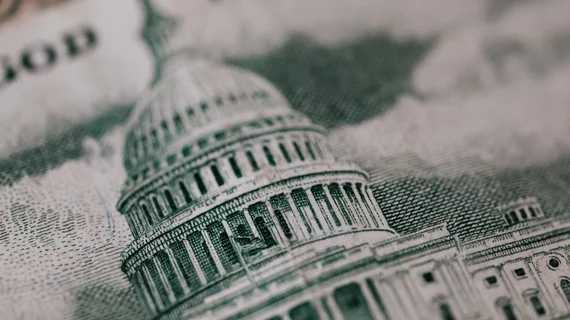House lawmakers advance bill to blunt radiologist pay cut in 2024
Two key congressional committees recently passed legislation that would blunt planned pay cuts for radiologists and other physicians in 2024.
On Thursday, House Energy & Commerce announced it advanced a package of healthcare-related bills out of committee. The list included H.R. 6545, the “Physician Fee Schedule Update and Improvements Act,” which incorporates an increase to the conversion factor to match the support Congress provided in 2023 and partially offset a looming 3.4% cut in 2024. This action aligns with a bill that the Senate Finance committee passed last month.
In an announcement, co-sponsors noted that the bill also proposes increasing the budget neutrality threshold from $20 million to $53 million. This would “allow for greater flexibility in determining pricing adjustments for services without leading to harmful payment cuts for doctors.”
“Physicians across the country, who treat Medicare patients out of the goodness of their hearts, continue to be crushed by Medicare reimbursement cuts by bureaucrats in Washington. I am point-blank fed up with this nonsense,” Rep. Greg Murphy, MD, R-N.C., a practicing surgeon, said in a statement issued Dec. 6. “Rural communities have been overwhelmingly impacted by these cuts over the years. This bipartisan legislation takes aim at some of the harmful cuts set to burden physicians come January 1st.”
The Centers for Medicare & Medicaid Services did not update supply and equipment prices between 2005 to 2019, the bill’s sponsors noted. Nor did CMS address clinical staff wages from 2002 to 2022. The agency did eventually boost payment rates, but “incremental increases would have allowed doctors to plan better,” Murphy and colleagues contend.
“This bill brings needed stabilization to reimbursement and updates the formula to reflect accurate costs of running a medical practice,” according to the announcement.
Others co-sponsoring the House bill include Reps. Mariannette Miller-Meeks, R-Iowa, Larry Bucshon, MD, R-Ind., Kim Schrier, D-Wash., Robin Kelly, D-Ill., Ami Bera, MD, D-Calif., Brad Wenstrup, R-Ohio, Raul Ruiz, MD, D-Calif., Michael C. Burgess, MD, R-Texas, and Tony Cárdenas, D-Calif.
The American Academy of Family Physicians on Dec. 5 thanked members of Congress for introducing the bill, calling it an “important first step.”
“We support the necessary short-term relief your legislation provides to physicians for the upcoming year,” AAFP Board Chair Tochi Iroku-Malize, MD, MBA, said in a letter to the bill’s sponsors. “But the academy continues to advocate alongside the entire physician community in support of long-term, meaningful reforms, including an annual inflationary update to Medicare physician payment based upon the Medicare Economic Index. We have also continued to urge Congress to provide relief from the zero-sum budget neutrality requirements that undermine positive policy changes and hamstring CMS’ ability to appropriately pay for all the services a beneficiary needs.”
The Senate Finance Committee passed its own package of bills in November. This included providing a 2.5% increase to the conversion factor. Both proposals will be taken up by the full House and Senate.
The American College of Radiology has urged physicians to reach out to their representatives, asking them to halt the impending cuts. As of Dec. 1, its members had sent more than 4,100 emails, 121 tweets and made 60 phone calls to Congress.
“Due to the uncertainty of which provision, if any, addressing physician payment will be included in a year-end package passed by Congress, the call-to-action will serve as a vital reminder to Congress that they need to reduce or eliminate the full 3.4% Medicare cut,” ACR said in a recent news update.

